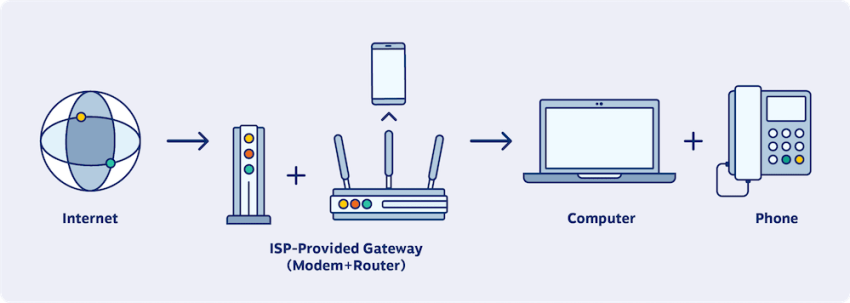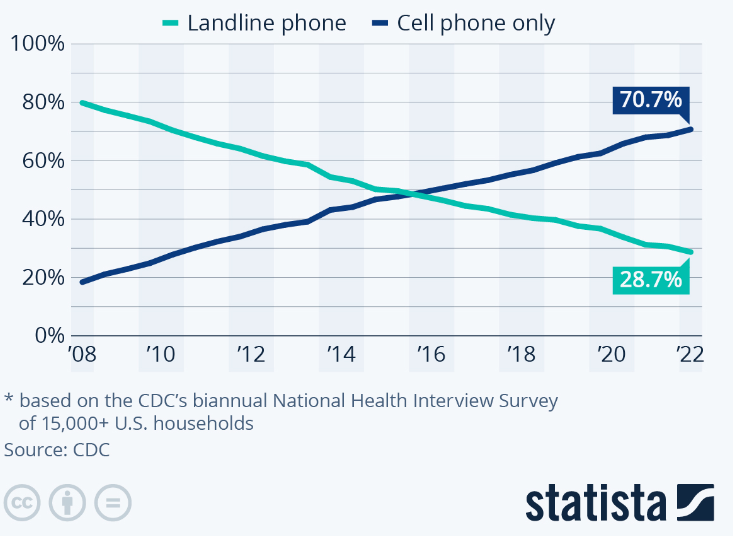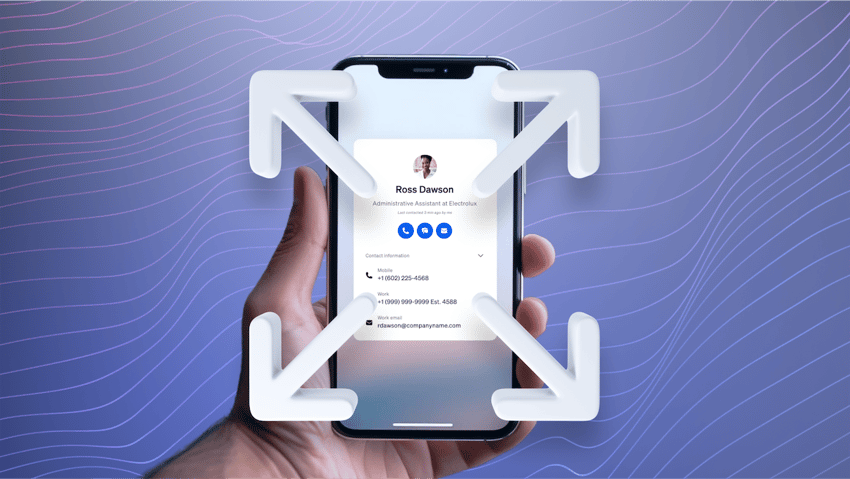Getting your business reliable phone service starts with the right phone system. Voice over Internet Protocol (VoIP) offers an easy way to make and receive phone calls at a low cost.
But one key decision remains: should you use a fixed or non-fixed VoIP phone system?
There are a few noteworthy differences between non-fixed and fixed VoIP service regarding your business phone lines.
In short, it can affect the response times of emergency services, but there’s an easy solution to ensure your virtual number is protected.
This guide details key distinctions between fixed and non-fixed VoIP phone numbers.
VoIP Phone Service Basics
Voice over Internet Protocol, or VoIP, works by placing calls through your internet connection. In fact, VoIP calls work on any internet connection, unlike traditional phone lines.
VoIP calls turn voice phone calls into data packets and are sent through a VoIP phone service provider. From here, your hosted VoIP service provider relays calls between your device and the public telephone network.

Phone numbers are either tied to a physical location, like traditional landlines, or they are virtual phone numbers that exist on the Internet.
Since the widespread adoption of broadband, reliance on a physical landline isn’t needed. As a result, many businesses now use a non-fixed VoIP phone number.
A few areas in which non-fixed and fixed VoIP differ include:
- Outgoing Caller ID
- IP address accessibility
- Unified communications
- Emergency call routing
You don’t want your potential and existing customers to avoid answering their phones when you’re calling. This is where choosing the right VoIP number option helps.
Let’s dive deeper into this VoIP technology and how it could affect your business.

What Is a Non-Fixed VoIP Phone Number?
A non-fixed VoIP phone number isn’t attached to a physical address. It’s also known as a virtual phone number. Just like fixed VoIP numbers, it can be used as a residential or business phone line as part of a company’s phone system.
Since they don’t require a fixed address, non-fixed VoIP numbers can be associated with one or more geographical locations. It means they’re a great solution for serving customers in areas where you don’t have a physical location.
With non-fixed VoIP, you don’t need to have a physical address to have a number that matches it. It’s excellent for people who work remotely or businesses with a virtual workforce. For instance, if you have a virtual call center.
Non-fixed VoIP numbers are easy to get, and they’re often issued by free and low-cost services like Google Voice. Unfortunately, this means they also attract fraudulent activity and scams.
One criticism of a non-fixed VoIP phone number is that phone calls to 911 from a non-fixed number aren’t easily traceable. If you choose this option, make this limitation clear.
🚨 There’s an easy solution to ensure emergency services respond quickly when dialing 9-1-1. Setting up Enhanced 911 (E911) allows you to transmit your physical address regardless of which VoIP system or VoIP phone you use.

What Is a Fixed VoIP Phone Number?
A fixed VoIP phone number is bound to a physical address. Make no mistake, it’s still an internet-based phone line. It has an account owner and a real address assigned to it. Such fixed VoIP numbers are assigned to one subscriber at a time, typically found by directory assistance.
This address can be a residential one or a company’s office. VoIP numbers can easily be reassigned to different phone services through a process known as porting, in case you relocate or change VoIP providers.
The advantages of a fixed VoIP number include:
- Simplicity: Each phone line is installed by the telephone company and generally doesn’t change after it’s set up.
- Emergency services: Without a doubt, an emergency call can only come from the actual address of the telephone company, so dispatchers know exactly where to send public safety personnel.
- Independence: Fixed VoIP numbers give the owner flexibility in updating their caller ID and republishing to a CNAM database.
Since these types of phone numbers relate to a single user or operator, it’s unlikely a VoIP call will be deemed suspicious. A large volume of outbound calls can get flagged by telephone companies, but it’s not an issue here.
In general, fixed VoIP numbers are more trustworthy than non-fixed VoIP ones. It means they’re less likely to be used by fraudsters and scammers because it’s harder to mask their identity.
Fixed VoIP numbers make the subscriber location match the user of the phone. Want to see how others see your telephone number? You can check it out here.
Comparison of Fixed VoIP & Non-Fixed VoIP
First, let’s have a look at what fixed and non-fixed VoIP numbers have in common:
- Relying on an internet connection
- Same types of VoIP phones and devices
- Identical VoIP benefits, like lower cost and ease of use
- Can be used to send and receive text messages
Fixed VoIP vs. Non-fixed VoIP at a glance
| Feature | Fixed VoIP | Non-Fixed VoIP |
|---|---|---|
| Associated Physical Address | Yes | No |
| Location Portability | Low | High |
| Call cuality & reliability | Excellent, single point of failure | Excellent, multiple redundancies |
| Emergency services | Accurate location provided | May route incorrectly |
| Number of users | One | Multiple |
| Scalability | Requires number administration | Numbers easily added/changed |
| Cost | Higher initial cost | Lower costs |
| Fraud prevention | Excellent caller ID verification | Higher fraud potential |
Fixed VoIP specifics
With a fixed VoIP system, a physical address is necessary. If your company is well established in your location(s) and serves local customers, that’s no issue. In fact, it’s an advantage. It makes your presence there authentic.
However, if you have customers globally, fixed VoIP numbers make it hard to build a presence where your customers are if you don’t have an address near them.
There’s no way around this if you choose the fixed route. This is why VoIP phone services are rarely entirely fixed unless the service is provided by a local phone company known as a Local Exchange Carrier (LEC).
Another downside is the cost you’ll incur for long-distance and international calls.
Non-fixed VoIP specifics
A non-fixed VoIP system is an ideal solution when you need a local number but don’t have a local presence. For example, you’re in the U.S. but also have Canadian customers or customers elsewhere.
If you have a distributed workforce, you can make sure each person’s individual phone number, known in the industry as a Direct Inward Dialing (DID) number, matches your company’s format. This ensures everyone has a direct number relevant to the location they serve without needing multiple physical phone lines.

Depending on the VoIP service provider you choose, you can also get unlimited calling and features like recording business calls, voicemail transcription, call queuing, and conference calls.
Although non-fixed VoIP numbers are often the solution of choice for fraud, there’s been consistent progress in systems that counteract it. This gives non-fixed VoIP a better reputation and opens its doors for businesses even more.
Even if you have a non-fixed VoIP number, register your business listing on places like Yelp, Google Business Profile, and Bing. At a minimum, this will at least display your company information when people search for your phone number.
Some softphone apps match your phone number to your business information found online, which improves the rate at which people answer the phone.
Types of VoIP Services
Wondering how to get your hands on a VoIP solution? Here are three standard options:
☎️ Business phone service: This is an end-to-end solution that gives you high-quality phone calls at a lower cost. It’s completely portable, scalable, and offers international calling. It hosts all of your communications, from audio and video calls to live chat and even a CRM.
🏢 SIP trunking: You can take your PBX equipment into a cloud system without new equipment or service disruptions. Your calls no longer use traditional phone lines but rely on your internet connection. It gives you advanced multi-line phone system features and centralizes your voice and data in one place.
🤝 Contact centers: Running a call center in the cloud means you can make it more productive. Cloud-based call centers let you handle massive inbound call volumes and automate multichannel customer support, as well as offer self-service options. The best part is that these contact center solutions are hosted entirely in the cloud without any difficult setup. You don’t even need desk phones — calls can be made entirely from your computer.
Takeaway: Non-Fixed VoIP is Better
In 2024, non-fixed VoIP is the better option for businesses so they can provide remote work capabilities for their team, easily add more locations, and eventually add a call center if they need to.
Despite the nuances of non-fixed virtual phone numbers, most of their limitations have been addressed. Your needs as a VoIP user will help you determine your best choice based on what we’ve outlined in this guide.
Start calling for just $15/mo.
See why over 100,000 businesses switched to Nextiva. Now you can get it all for $15/month per user.
Thanks to secure internet services, data warehouses, and frequent updates of the CNAM, concerns about a non-fixed VoIP number are put to rest.
However, VoIP phone numbers certainly affect your ability to reach public safety services in a timely manner; make sure to train your staff to use their cell phones instead and be sure to update your E911 records on file.
It all comes down to choosing the best VoIP provider. Select the one with great customer service and an excellent track record. Ask questions about everything you need so you can set up your phone system with ease!
FAQs
Yes, it is possible to determine if a phone number is a non-fixed VoIP number, but it can be a challenging task without contacting the phone number provider directly. The reason for this difficulty is that non-fixed VoIP numbers do not have a specific geographic association like traditional phone numbers. In appearance and functionality, non-fixed VoIP numbers resemble regular telephone numbers.
However, there are some methods you can try to identify if a phone number is a non-fixed VoIP number. One approach is to conduct a number lookup or reverse phone lookup. This process utilizes CNAM (caller name) data, which helps in finding the name associated with a given phone number. It may provide some clues as to whether the number belongs to a non-fixed VoIP service.
Although it could be useful, it is worth mentioning that relying solely on a number lookup or reverse phone lookup is not always guaranteed to be reliable. The accuracy and availability of CNAM data can vary, and it might not consistently indicate if a number is associated with a non-fixed VoIP service.
Texting with a non-fixed VoIP number is possible. By configuring your non-fixed VoIP phone numbers, you can enable the option to send and receive text SMS messages. So, the answer is yes, you can definitely text a non-fixed VoIP number by configuring your VoIP phone numbers accordingly.
Non-fixed VoIP is a cost-effective option for businesses due to several factors. VoIP providers typically operate on a subscription-based model. Over the years, the cost of a VoIP phone system has come down to about $20 per month per user. This means that businesses only need to pay a monthly fee, eliminating the need for large upfront investments or expensive setup and implementation processes.
With non-fixed VoIP, businesses can avoid the costs associated with maintaining a physical location or office. Instead of relying on a traditional phone system that requires physical connections, non-fixed VoIP allows businesses to operate using cloud-based technology. This eliminates the need for expensive on-premises PBX equipment, reducing costs significantly.


















 VoIP
VoIP 











